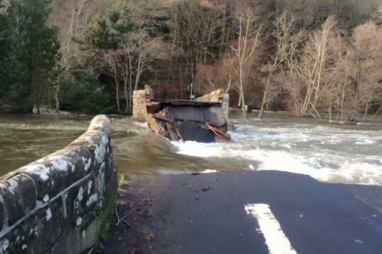
Flood resilience inadequate as flooding hits infrastructure and property
Infrastructure across the North of England was devastated this weekend as record levels of rainfall caused rivers across the region to overtop defences.
Roads, railways, properties, power supplies and other utilities across the north of England have been devastated by severe flooding this weekend.
“Our flood defences and the swift actions of emergency services have protected thousands of properties across the country but unprecedented levels of rainfall mean that the water in some areas has risen to levels never seen before,” said Environment Secretary Elizabeth Truss. “That has meant that while flood defences have delayed and reduced the impact, we have seen some water overtopping defences in places.”
A UK record of 341mm of rainfall in 24 hours was recorded at Honister in Cumbria, causing rivers across the region to burst their banks. Flood defences including a £38M scheme built to protect Carlisle following the 2005 flooding, were unable to hold back the deluge. The scheme which was completed in 2010 includes 10km of raised defences and 30 new flood gates. It was designed to withstand a 1 in 200 year event and has protected the city from storms in 2012 and 2013 but the fact that this has been breeched just five years later highlights the challenge facing those responsible for infrastructure resilence as the severity of weather events increases.
"There is now a major task ahead of us in terms of repairing the damage caused by these floods, and I am calling on the government to support us in this and make additional funds available,"
Tim Farron, South Lakeland MP
Power and transport networks have been cut off by the water with Network Rail confirming that the West Coast Mail Line north of Carlisle would be closed for several days to deal with the impact of the floods.
“North of Carlisle station, we have to wait for eight feet of water to recede before we can carry out extensive safety checks and repairs – including rebuilding a host of complex electrical and signalling equipment which is currently underwater,” said Martin Frobisher, route management director at Network Rail. “This, coupled with dozens of other sites which have been flooded or damaged, means we have a lot of work to do to ensure the railway is safe and able to be used.”
Liberal Democrat leader and MP for South Lakeland Tim Farron has called on government to provide additional funding to Cumbria to help repair the damage and asked insurance companies to deal quickly with claims."There is now a major task ahead of us in terms of repairing the damage caused by these floods, and I am calling on the government to support us in this and make additional funds available," said Farron who lives in south Cumbria.
"My thanks go to all the staff and volunteers from the emergency services, local authorities and voluntary organisations, for the hard work they have put in to try to minimise the impact of the floods. Electricity NW also deserve credit for their efforts trying to restore power to those affected by power cuts. My thanks also go to rail staff who worked hard to deal with disruption to the network and assist passengers."
“North of Carlisle station, we have to wait for eight feet of water to recede before we can carry out extensive safety checks and repairs," Martin Frobisher, Network Rail.
Over the next five years the government has committed to investing in 1400 flood defence projects costing £2.3bn, which will protect 300,000 properties. However experts have already warned that capital investment is not enough and urged government to halt the decline in flood maintenance spending.
Late last year the Chartered Insitute for Water and Environmental Management warned that the current approach was increasing local flood risk.“CIWEM believes that the current emphasis on capital investment to the detriment of annual maintenance works is increasing flood risk at a local level,” said the organisation pointing to National Audit Office figures showing maintenance spending declining at 6 per cent per annum between 2010 and 2014.
The events in Cumbria highlight recent research from consultant Mott MacDonald with Anglian Ruskin University which warned that current investment levels and the damage caused by climate change events was widening.The report warns of the shock load that climate events place on insufficiently resilient assets triggering a potential collapse of the system functionality such as damaging infrastructure, disabling supply chains and causing cascade failures throughout interconnected assets.
It points to events such as the failure of the rail line at Dawlish in south west England damaged by a storm in February 2014, during a record breaking wet and windy winter. “The damage cut off rail links with much of Cornwall and Devon for several weeks, and is estimated to have cost the economy £1.2bn,” says the report.